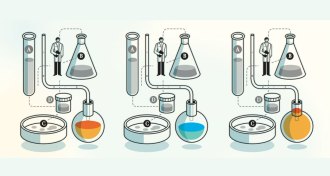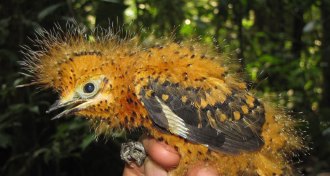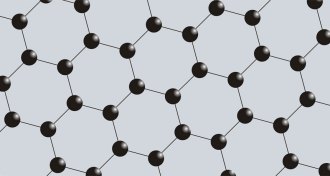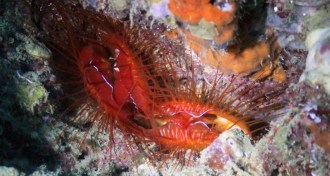Uncategorized
-
 Science & Society
Science & SocietyIs redoing scientific research the best way to find truth?
Researchers don’t even agree on whether it is necessary to duplicate studies exactly or to validate the underlying principles.
-
 Health & Medicine
Health & MedicineAsthma may add to sleep apnea risk
A long-term sleep study strengthens the link between the two breathing disorders asthma and sleep apnea.
By Nathan Seppa -
 Health & Medicine
Health & MedicineMore oxygen may lead to more tumors
Lung cancer risk drops at higher elevations where the air is thinner.
-
 Animals
AnimalsAmazonian bird may act the part of its hairy caterpillar disguise
A rare view of a baby cinereous mourner feeds debate over whether the bird both looks and acts the part of a toxic hairy caterpillar as defense against predators.
By Susan Milius -
 Materials Science
Materials ScienceGraphene’s allure becomes magnetic
Single-atom-thick sheets of carbon called graphene can be magnetized with the help of an insulating magnet.
By Andrew Grant -
 Astronomy
AstronomyLarge rocky planets excel at ocean building
Rocky planets a few times as massive as Earth may build deeper oceans – and sustain them for longer – than smaller worlds.
-
 Humans
HumansBabbling to babies is OK, despite previous warnings against it
Fifty years ago, a researcher advised banning baby talk, but results since then say otherwise.
-
 Animals
AnimalsDisco clams may flash chemical-weapons warning
Puzzling disco clam light show might warn predators not to bite.
By Susan Milius -
 Astronomy
AstronomyHubble telescope captures panorama of Andromeda galaxy
The Hubble Space Telescope captured a panoramic mosaic of the closest spiral galaxy to the Milky Way, mapping the light from over 100 million stars.
-
 Climate
ClimateWarming climate will force airlines to shed weight, increase costs
More frequent hot days coming with climate change will require airlines to reduce aircraft takeoff weight.
-
 Earth
EarthPumping carbon dioxide deep underground may trigger earthquakes
Injecting carbon dioxide deep underground offers a promising way to curb global warming, but the extra pressure may cause faults to slip or fractures to release the buried gas.
-
 Astronomy
AstronomyPair of black holes prepare to take the plunge
A pair of supermassive black holes in a distant galaxy will likely collide in the next million years.